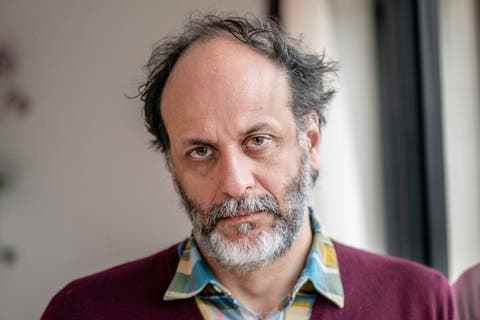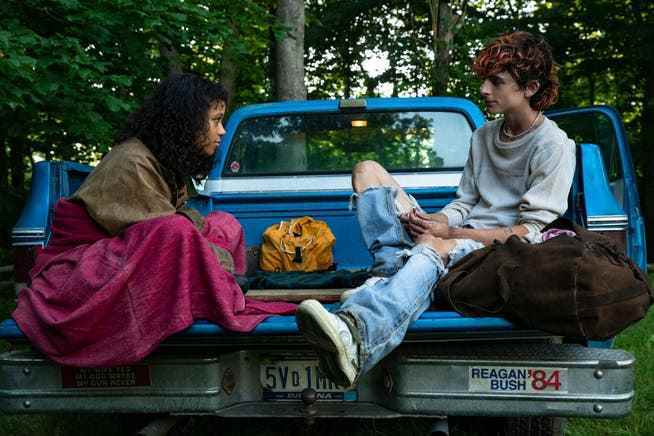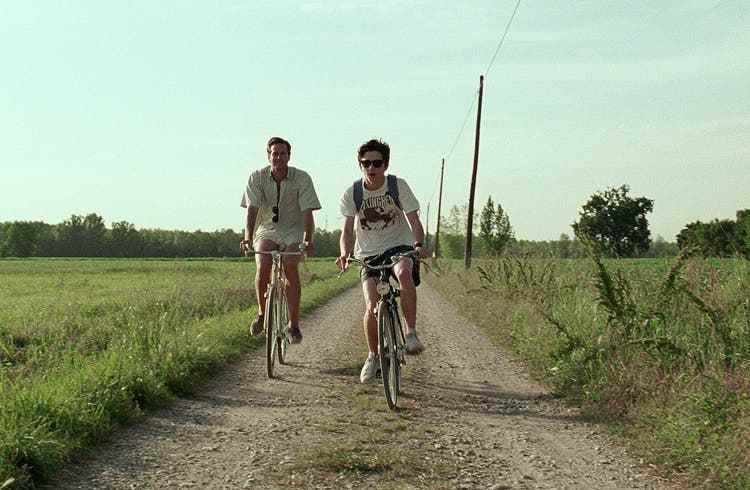The Zurich Film Festival honors the filmmaker who enchanted everyone in 2017 with the gay love story “Call Me by Your Name”. The Italian also tells of young love in “Bones and All”. But with a morbid twist: the adolescents have uncontrollable cannibalistic cravings.
A summer romance, beautiful like no other: Elio (Timothée Chalamet) and Oliver (Armie Hammer) in “Call Me by Your Name” (2017).
Luca Guadagnino comes home from class. He is currently teaching at a film school in Rome, explains his press agent, who set up the zoom link. Then Guadagnino joins in: He’s sitting in the back seat of a car in a parking lot. The director has made a makeshift solution by tucking the mobile phone into which he is speaking between the front seats. The camera angle from below takes some getting used to. Besides, it’s evening and Guadagnino will soon be sitting in the dark. But what can you do? Even before he won the director’s prize for “Bones and All” in Venice two weeks ago, people tried to speak to him, the man never has time. Five years ago it was even easier. He came to the ZFF to present «Call Me by Your Name». The conversation then took place over lunchtime, Guadagnino had just eaten and then even shared his dessert. – So now the cannibal film. . .
Mr Guadagnino, do you like to eat?
Very much. However, as I get older, my love for food conflicts more and more. I need to get smarter and ask myself what I can eat. My body can no longer tolerate gluttony.

«Until now, filmmaking has not been fun. It was exhausting, always a cramp. I’m just learning to enjoy it,” says Luca Guadagnino.
eat too while watching a movie at home?
At most I munch on something. No, I don’t eat while watching a movie.
Are you concentrating on the film?
Yes.
When did you learn to enjoy good food?
I would say between the ages of one and six. I remember very well how I played «Essen» as a child. I had miniature pots as toys, as well as a pan with wheels, the lid of which moved as if from steam.
So your love for food predates your love for the movies?
Maybe at the same time. I remember going to the cinema with my parents at a very young age in Ethiopia, where I grew up. Those big buildings with the big screens. . . In Addis Ababa we had cinemas from the terrible days of fascist Italian colonialism. I saw Lawrence of Arabia on my mother’s lap.
Are Eating and watching movies are similar pleasures for you?
Movie watching is stronger. Because it leaves very profound impressions, images that stay. If you want or not. While food can also be revealing, a taste can evoke the past. Or you are overwhelmed when a great chef creates a new taste experience. But that’s rare. You see that kind of thing a lot in the cinema.
“Call Me by Your Name” is five years old. Is memory wrong, or does everyone eat all the time in the film?
That’s what we all do. We eat all the time.
In any case, in this and in your new film, young people find love – and they eat.
Ha! Yes, okay.
So how are food and young love connected?
When you’re young, you learn things without knowing you’re learning them. You experience something and you don’t intellectualize it. But it just suits you. You are like a sponge that unconsciously absorbs everything. There is a great film by Bernardo Bertolucci, «La Luna». In it, a boy licks dripping honey from his hands. That’s what it’s like when you’re young and eager.
“Bones and All” is about a special hunger.
I think it’s about the hunger for connection and reconciliation.
In the film, a young woman embarks on a journey across the United States in search of her mother. She has a cannibalistic need, which she is at the mercy of and wants to understand.
Hunger also represents anger and rage. It stands for not wanting to be like the adults who abandoned the young and turned them into outsiders. All the adults in this film exclude the children. And this despite the fact that these children have to deal with their cannibalism and it is tormenting for them. In a way, Bones and All asks our teenagers to revolt against mothers and fathers who want to oblige them to embrace their own hopelessness. It’s about the utopian dream of young people not to become as bad as adults.
Is it also a film about America?
Of all the places I’ve seen in my life, tenderness and cruelty are closest together here. The country has shown me how impossible the dream of the right to happiness for everyone, which is suggested by the constitution, is. Capitalism also shows its inhuman side and leaves many people behind. Nevertheless, the sense of community in America is so strong that it also includes those left behind.
Just like the cannibals in the movie. But why is cannibalism actually necessary? You could have told the story without him.
But why not the story? With tell the cannibalism? Why do we choose one path in our lives and not the other? I don’t think everything has to be explainable. But if I had to look for an explanation for you, I would say: subconsciously I was probably trying to pick up on a taboo. When Céleste Albaret, Marcel Proust’s housekeeper, read Sodom and Gomorrah, the volume that was to cause a scandal, she said to Proust: “You can’t publish that.” He said to her: «Céleste, there is nothing that cannot be said. It all depends on how you say it.”
So you were concerned with finding a language and telling about something that actually seems impossible to tell?
Yes, I tried that.
It works. They tenderly relate a cannibalistic romance.
In the film, the mother of the young cannibal says: “There is no place for monsters in the world of love.” For me, this film is about the fact that there is a place for monsters in the world of love.

Cannibal and love: Maren (Taylor Russell) meets Lee (Timothée Chalamet) on her journey through America. Scene from «Bones and All».
The film feels so lighthearted. Was it a simple shoot?
No, he was tough. I live in Italy, being in America for five months is hard for me. It’s also a road movie, you have to keep going back to somewhere new. Shooting with camera cars is also a tedious process. Ah, it was . . . (He sighs loudly.)
How do you eat while filming?
I eat. A little compulsive. And especially junk food, because you don’t have time. But I still sleep well. Turning is exhausting, the body has a different metabolism.
Do you actually eat everything?
More or less.
are vegans So not you.
No no.
Do you eat with the actors?
I used to have the romantic idea of taking lunch breaks together. But then I started making films. A director doesn’t have that privilege. You always have to think about what to shoot next. And the actors have to focus on the next scene. Since I started making films, I haven’t managed to eat more than three or four times on a film set with my cast or crew.
The cinema is in crisis. Mr. Guadagnino, have people been overfed with films?
No! People are fed up with images, that’s it. Constantly this flood of images. Cinema didn’t overfeed people. One is «blasé» and no longer wants to see more pictures. Cinema is not about pictures at all.
No?
Robert Bresson said something like: It’s not about the beauty of the picture. The point is that the juxtaposition, the juxtaposition of images, creates a third image, an image in the mind. This is what you see. I’ve been told for forty years that cinema is dying. I’m 51. I was a kid when I heard the movies were over. And yet here I am. You are here too. We are people who work in and around cinema, we enjoy it. Come to think of it, I’m optimistic.
But don’t you also miss the film artists of the past, who had a more urgent film language? For whom cinema was life?
I also don’t like watching movies that are like filmed screenplays, sure. But there were always bad films, even in the days when the best films existed. It’s okay today. You just don’t have to watch the bad movies.
Do you still have the same appetite for making films as you used to?
Only now am I beginning to enjoy it. Until now, filmmaking has not been a pleasure. It was exhausting, always a cramp. I’m just learning to enjoy it and be happy about it. I’m beginning to understand some things better. You’re doing a psychoanalysis with me!
That was not the intention.
They make me think about myself. But that’s good. I now see the happiness ahead of me of making more films.
And how’s it going it at school with teaching?
This isn’t going well. The level is deep. I have fourteen drama students and six aspiring directors, all in their mid-twenties. It’s a disaster.
And despite everything, do you have hope for the future of cinema?
Naturally! I also just read a script by one of the boys, it’s incredibly beautiful. So pure and poetic, funny too. I would even have liked to have made the film myself.
But you let him do the student?
Yes. You have to be generous.
Guadagnino takes the A Tribute to . . . Award at the screening of «Bones and All» on September 30th and will give a public master class on October 1st. The first performance of «Bones and All» will take place on September 23rd.

